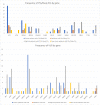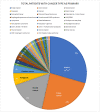Investigating the prevalence of pathogenic variants in Saudi Arabian patients with familial cancer using a multigene next generation sequencing panel
- PMID: 37306523
- PMCID: PMC10259259
- DOI: 10.18632/oncotarget.28457
Investigating the prevalence of pathogenic variants in Saudi Arabian patients with familial cancer using a multigene next generation sequencing panel
Abstract
Family history is an important factor in determining hereditary cancer risk for many cancer types. The emergence of next-generation sequencing (NGS) has expedited the discovery of many hereditary cancer susceptibility genes and the development of rapid, affordable testing kits. Here, a 30-gene targeted NGS panel for hereditary cancer risk assessment was tested and validated in a Saudi Arabian population. A total of 310 subjects were screened, including 57 non-cancer patients, 110 index patients with cancer and 143 of the cancer patients' family members, 16 of which also had cancer. Of the 310 subjects, 119 (38.4%) were carriers of pathogenic or likely pathogenic variants (PVs) affecting one or more of the following genes: TP53, ATM, CHEK2, CDH1, CDKN2A, BRCA1, BRCA2, PALB2, BRIP1, RAD51D, APC, MLH1, MSH2, MSH6, PMS2, PTEN, NBN/NBS1 and MUTYH. Among 126 patients and relatives with a history of cancer, 49 (38.9%) were carriers of PVs or likely PVs. Two variants in particular were significantly associated with the occurrence of a specific cancer in this population (APC c.3920T>A - colorectal cancer/Lynch syndrome (p = 0.026); TP53 c.868C>T; - multiple colon polyposis (p = 0.048)). Diverse variants in BRCA2, the majority of which have not previously been reported as pathogenic, were found at higher frequency in those with a history of cancer than in the general patient population. There was a higher background prevalence of genetic variants linked to familial cancers in this cohort than expected based on prevalence in other populations.
Keywords: NGS; cancer; cancer screening; genetic counseling; hereditary cancer syndrome.
Conflict of interest statement
Authors have no conflicts of interest to declare.
Figures




Similar articles
-
Comprehensive analysis of germline mutations in northern Brazil: a panel of 16 genes for hereditary cancer-predisposing syndrome investigation.BMC Cancer. 2021 Apr 7;21(1):363. doi: 10.1186/s12885-021-08089-9. BMC Cancer. 2021. PMID: 33827469 Free PMC article.
-
Canonical and uncanonical pathogenic germline variants in colorectal cancer patients by next-generation sequencing in a European referral center.ESMO Open. 2022 Dec;7(6):100607. doi: 10.1016/j.esmoop.2022.100607. Epub 2022 Nov 7. ESMO Open. 2022. PMID: 36356413 Free PMC article.
-
Prevalence and Spectrum of Germline Cancer Susceptibility Gene Mutations Among Patients With Early-Onset Colorectal Cancer.JAMA Oncol. 2017 Apr 1;3(4):464-471. doi: 10.1001/jamaoncol.2016.5194. JAMA Oncol. 2017. PMID: 27978560 Free PMC article.
-
Recommendations for Preventive Care for Women with Rare Genetic Cause of Breast and Ovarian Cancer.Klin Onkol. 2019 Summer;32(Supplementum2):6-13. doi: 10.14735/amko2019S6. Klin Onkol. 2019. PMID: 31409076 Review. English.
-
Moderate penetrance genes complicate genetic testing for breast cancer diagnosis: ATM, CHEK2, BARD1 and RAD51D.Breast. 2022 Oct;65:32-40. doi: 10.1016/j.breast.2022.06.003. Epub 2022 Jun 18. Breast. 2022. PMID: 35772246 Free PMC article. Review.
Cited by
-
Epidemiology and patterns of GI tract cancers in Saudi Arabia: benefit of prompt lifestyle changes.Int J Clin Exp Pathol. 2025 Jun 15;18(6):222-232. doi: 10.62347/OLDP2841. eCollection 2025. Int J Clin Exp Pathol. 2025. PMID: 40642397 Free PMC article. Review.
-
Investigation of germline variants in Bahraini women with breast cancer using next-generation sequencing based-multigene panel.PLoS One. 2023 Sep 1;18(9):e0291015. doi: 10.1371/journal.pone.0291015. eCollection 2023. PLoS One. 2023. PMID: 37656691 Free PMC article.
-
Cancer Genetics in the Arab World.Technol Cancer Res Treat. 2025 Jan-Dec;24:15330338251336829. doi: 10.1177/15330338251336829. Epub 2025 Apr 22. Technol Cancer Res Treat. 2025. PMID: 40261300 Free PMC article. Review.
-
Whole exome sequencing of a novel homozygous missense variant in PALB2 gene leading to Fanconi anaemia complementation group.Biomed Rep. 2024 Mar 1;20(4):67. doi: 10.3892/br.2024.1756. eCollection 2024 Apr. Biomed Rep. 2024. PMID: 38476606 Free PMC article.
-
Screening, awareness and challenges for colorectal cancer treatment in Saudi Arabia: an update.Bioinformation. 2024 Apr 30;20(4):397-403. doi: 10.6026/973206300200397. eCollection 2024. Bioinformation. 2024. PMID: 38854755 Free PMC article.
References
-
- National Cancer Institute (USA). Cancer Genetics Overview (PDQ®)–Health Professional Version. 2006. https://www.cancer.gov/about-cancer/causes-prevention/genetics/overview-pdq. - PubMed
-
- Jazieh AR, Da’ar OB, Alkaiyat M, Zaatreh YA, Saad AA, Bustami R, Alrujaib M, Alkattan K. Cancer Incidence Trends From 1999 to 2015 And Contributions Of Various Cancer Types To The Overall Burden: Projections To 2030 And Extrapolation Of Economic Burden In Saudi Arabia. Cancer Manag Res. 2019; 11:9665–74. 10.2147/CMAR.S222667. - DOI - PMC - PubMed
Publication types
MeSH terms
LinkOut - more resources
Full Text Sources
Medical
Research Materials
Miscellaneous

